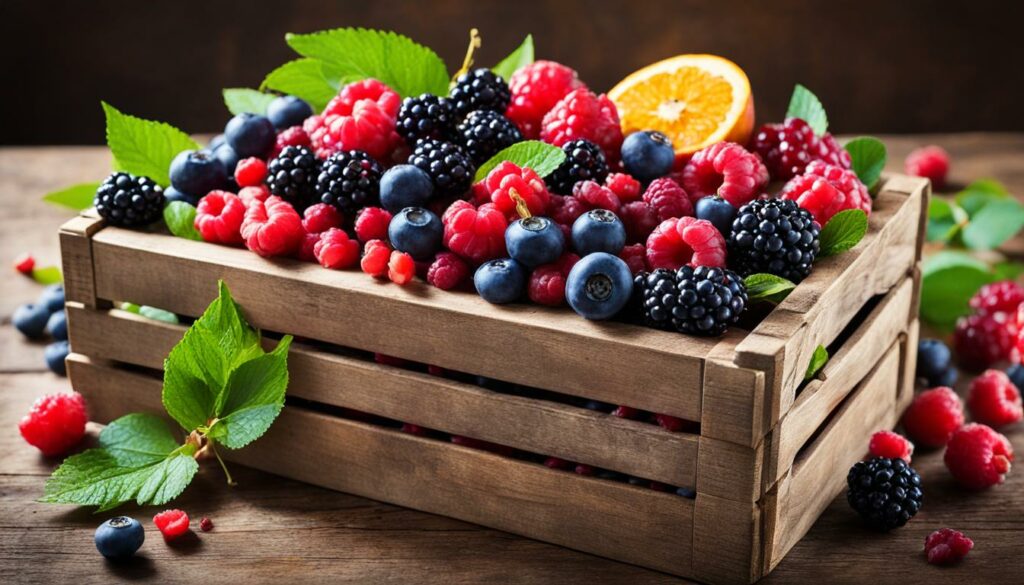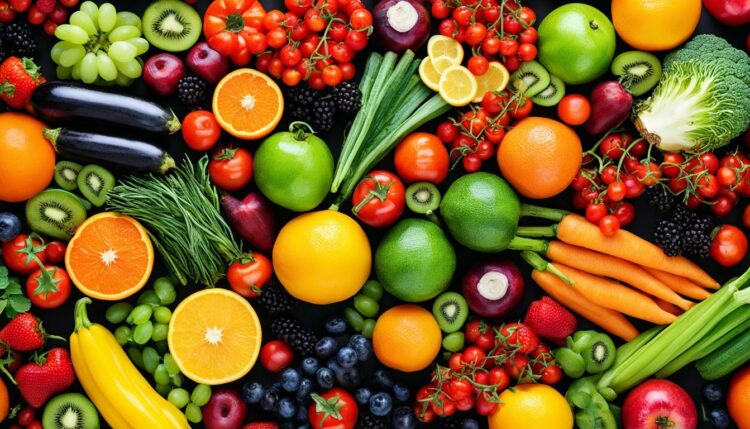Polyphenols are natural chemicals found in plants that have remarkable antioxidant properties. These compounds play a crucial role in counteracting oxidative stress and protecting cells from damage, making them valuable allies in the fight against aging.
Polyphenols also possess anti-inflammatory effects, reduce the risk of chronic diseases, and can even inhibit the growth of cancer cells.
There are different types of polyphenols, including flavonoids, phenolic acids, and stilbenes, each with their own unique benefits. To harness the power of polyphenols, it is essential to incorporate a variety of fruits, vegetables, whole grains, legumes, nuts, and seeds into your diet.
By doing so, you can take advantage of the anti-aging properties of polyphenols and promote cellular health in a natural and effective way.
Key Takeaways:
- Polyphenols are natural chemicals found in plants that have powerful antioxidant properties.
- They protect cells from oxidative stress and damage, contributing to the aging process.
- Polyphenols have anti-inflammatory effects and reduce the risk of chronic diseases.
- They can inhibit the growth of cancer cells.
- Fruits, vegetables, whole grains, legumes, nuts, and seeds are excellent dietary sources of polyphenols.
The Role of Polyphenols in Cellular Health
Polyphenols, abundant in various plant-based foods, play a crucial role in maintaining cellular health and combating the aging process. Their powerful antioxidant properties protect cells from oxidative stress, a key contributor to cellular aging.
Oxidative stress arises from an imbalance between the production of harmful free radicals and the body’s ability to neutralize them. These free radicals can cause damage to cellular structures, including DNA, proteins, and lipids, leading to accelerated aging.
By neutralizing free radicals, polyphenols help prevent oxidative damage to DNA, which is essential for maintaining cellular integrity and function. Furthermore, polyphenols promote DNA repair mechanisms, supporting the body’s natural ability to fix damaged DNA. This process is vital for preventing cellular dysfunction and maintaining cellular health.
Beyond their role in DNA repair, polyphenols also stimulate the production of collagen, a protein responsible for maintaining the elasticity and firmness of the skin. Collagen production naturally declines with age, contributing to the visible signs of aging such as wrinkles and sagging skin.
By supporting collagen synthesis, polyphenols help to combat these signs and promote a more youthful appearance.
To illustrate the impact of polyphenols on cellular health, here’s a brief table showcasing the benefits associated with polyphenols and their effects on aging:
| Polyphenols | Effects on Cellular Aging |
|---|---|
| Antioxidant properties | Protect against oxidative stress and DNA damage |
| Collagen production stimulation | Foster skin elasticity and firmness |
| Support DNA repair | Maintain cellular integrity and functionality |
In summary, polyphenols play a pivotal role in cellular health by protecting against oxidative stress, promoting DNA repair, and stimulating collagen production. By incorporating polyphenol-rich foods into your diet, you can effectively support cellular health and slow down the aging process.
The Anti-Inflammatory Effects of Polyphenols
Chronic inflammation is a common characteristic of aging and is associated with various age-related diseases. Polyphenols have been found to possess potent anti-inflammatory effects, helping to reduce chronic inflammation in the body.
By inhibiting inflammatory pathways and reducing the production of inflammatory markers, polyphenols can help mitigate the effects of chronic inflammation and promote healthy aging.
Chronic inflammation, known as low-grade systemic inflammation, is a persistent and low-level inflammation that occurs in the body over time. This type of inflammation can result from various factors, such as poor diet, sedentary lifestyle, and environmental toxins.
Over time, chronic inflammation can contribute to the development of many age-related diseases, including cardiovascular disease, diabetes, neurodegenerative diseases, and cancer.
Polyphenols, which are abundant in many plant-based foods, have been shown to have strong anti-inflammatory properties. These protective compounds can inhibit the production of pro-inflammatory molecules and modulate inflammatory signaling pathways, helping to reduce chronic inflammation and its detrimental effects on the body.
Inflammation is an underlying process in the development of several chronic diseases associated with aging including cardiovascular disease, type 2 diabetes, and neurodegenerative diseases.
There are several mechanisms by which polyphenols exert their anti-inflammatory effects. One of the key mechanisms is their ability to inhibit the activation of nuclear factor kappa B (NF-κB), a protein complex that plays a central role in regulating the expression of genes involved in inflammation.
By blocking NF-κB activation, polyphenols can suppress the production of inflammatory cytokines and other mediators of inflammation.
Furthermore, polyphenols can also activate various cellular defense pathways, such as the Nrf2 pathway, which regulates the expression of antioxidant enzymes and detoxification proteins. By promoting the production of endogenous antioxidants, polyphenols can help combat oxidative stress, a major driver of chronic inflammation.
Research has shown that specific polyphenols, such as resveratrol found in red grapes and berries, curcumin found in turmeric, and quercetin found in onions and apples, exhibit potent anti-inflammatory properties.
These polyphenols have been found to inhibit the activity of enzymes involved in the synthesis of pro-inflammatory molecules, further reducing inflammation in the body.
The anti-inflammatory effects of polyphenols are not only beneficial for overall health and well-being but also play a role in slowing down the aging process.
To reap the anti-inflammatory benefits of polyphenols, it is important to include a variety of polyphenol-rich foods in your diet. Fruits such as berries, cherries, and citrus fruits, as well as vegetables like kale, spinach, and broccoli, are excellent sources of polyphenols.
Herbs and spices like turmeric, ginger, and cinnamon also contain high levels of polyphenols.
Incorporating polyphenol-rich foods into your meals can help reduce chronic inflammation and promote healthy aging. Adding a sprinkle of cinnamon to your oatmeal or enjoying a cup of green tea with a squeeze of lemon are simple ways to increase your polyphenol intake.
Remember to choose whole foods over processed options, as processing can often degrade the polyphenol content.
By harnessing the anti-inflammatory power of polyphenols, you can support your body’s natural defense mechanisms and maintain optimal health as you age.

Summary:
Polyphenols possess potent anti-inflammatory effects, helping to reduce chronic inflammation and promote healthy aging. By inhibiting inflammatory pathways and reducing the production of inflammatory markers, polyphenols mitigate the detrimental effects of chronic inflammation.
Including polyphenol-rich foods in your diet, such as fruits, vegetables, herbs, and spices, can help harness the anti-inflammatory power of polyphenols and support your body’s overall health and well-being.
Polyphenols and Disease Prevention
The consumption of polyphenol-rich foods plays a significant role in preventing various diseases, particularly in promoting cardiovascular health and cognitive function.
Polyphenols, including flavonoids found in berries, citrus fruits, and green tea, have been associated with a decreased risk of cardiovascular disease by reducing blood pressure and protecting against cardiovascular issues.
Furthermore, regular intake of polyphenol-rich foods has been linked to improved cognitive function in older adults. These foods, such as dark chocolate, nuts, and red wine, enhance memory, attention, and overall cognitive performance.
To illustrate the potential benefits of polyphenols in disease prevention, the following table highlights a selection of polyphenol-rich foods and their impact on cardiovascular health and cognitive function:
| Polyphenol-Rich Foods | Cardiovascular Health | Cognitive Function |
|---|---|---|
| Berries (blueberries, strawberries, raspberries) | Improve blood pressure and reduce the risk of heart disease | Enhance memory and cognitive performance |
| Citrus fruits (oranges, grapefruits, lemons) | Lower cholesterol levels and protect against cardiovascular issues | Improve attention and cognitive function |
| Green tea | Reduce blood pressure and promote heart health | Enhance memory and cognitive function |
| Dark chocolate | Lower the risk of heart disease and improve blood flow | Enhance memory and cognitive performance |
| Nuts (almonds, walnuts, pecans) | Support healthy blood vessel function and reduce inflammation | Improve memory and cognitive function |
| Red wine (in moderation) | Protect against heart disease and improve blood lipid profile | Enhance cognitive performance and reduce the risk of cognitive decline |
By incorporating these polyphenol-rich foods into your diet, you can take proactive steps to prevent cardiovascular issues and support cognitive function, contributing to overall well-being and longevity.
Dietary Sources of Polyphenols
Polyphenols are essential antioxidants that can be obtained from a variety of plant-based foods. Including these dietary sources of polyphenols in your meals can provide numerous health benefits, including anti-aging properties and cellular health promotion.
Fruits Rich in Polyphenols
Fruits such as berries, citrus fruits, and apples are known for their rich content of polyphenols. These flavonoid-rich fruits not only offer a burst of flavor but also provide a powerful dose of antioxidants to combat oxidative stress and promote overall well-being.

Vegetables Rich in Polyphenols
In addition to fruits, vegetables also play a crucial role in providing polyphenols. Broccoli, spinach, and kale are excellent choices as they are packed with polyphenols that support cellular health and protect against oxidative damage.
By incorporating these vegetables into your diet, you can ensure a sufficient intake of polyphenols to support anti-aging and overall vitality.
Other Dietary Sources of Polyphenols
Besides fruits and vegetables, there are other plant-based foods that serve as great sources of polyphenols. Whole grains, legumes, nuts, and seeds offer a wide range of nutrients, including these beneficial compounds.
By including these polyphenol-rich foods in your meals, you can further enhance your antioxidant intake and maximize the anti-aging potential of your diet.
Summary
By incorporating fruits, vegetables, whole grains, legumes, nuts, and seeds into your diet, you can easily obtain a diverse range of polyphenols. These powerful antioxidants can help combat oxidative stress, promote cellular health, and contribute to overall anti-aging effects.
Embrace a diet rich in these dietary sources of polyphenols and unlock the potential for a healthier, more youthful you.
The Science Behind Polyphenols and Aging
Polyphenols, the natural chemicals found in plants, have been gaining attention for their remarkable anti-aging effects. These powerful compounds work through a variety of mechanisms to slow down the aging process and promote overall health and well-being.
In this section, we dive into the fascinating science behind polyphenols and their impact on aging.
Polyphenols and Gene Expression
One of the key ways polyphenols exert their anti-aging effects is by regulating gene expression. These compounds can activate genes that are involved in cellular health and longevity, while simultaneously inhibiting genes associated with aging.
By modulating gene expression, polyphenols have the potential to promote healthy aging and prevent age-related diseases.
Polyphenols and DNA Repair
Another mechanism through which polyphenols combat aging is by enhancing DNA repair mechanisms. DNA damage is a major contributor to the aging process, as it leads to cellular dysfunction and impaired functionality. Polyphenols help protect cells from DNA damage and promote their repair, ensuring their youthfulness and vitality.
Polyphenols and Collagen Production
Collagen, a protein that maintains the elasticity and firmness of the skin, plays a crucial role in maintaining a youthful appearance. Polyphenols have been found to support collagen production, helping to keep the skin firm and wrinkle-free. By promoting collagen synthesis, polyphenols contribute to a more youthful and vibrant complexion.
Current Research and Future Potential
The scientific research on polyphenols and their effects on aging is still evolving. However, the current findings suggest that these compounds have significant potential in slowing down the aging process, protecting against age-related diseases, and promoting overall health and well-being.
Ongoing studies continue to explore the precise mechanisms of polyphenols in aging, shedding light on new ways to harness their anti-aging benefits.
By incorporating polyphenol-rich foods into your diet, such as fruits, vegetables, whole grains, legumes, nuts, and seeds, you can harness the power of polyphenols and support healthy aging at a cellular level. So, start incorporating these mighty compounds into your meals and unlock their potential in your anti-aging journey.
Conclusion
Polyphenols are powerful antioxidants found in a variety of plant-based foods. These compounds play a significant role in anti-aging and cellular health by combating oxidative stress, reducing inflammation, and supporting overall well-being.
By incorporating polyphenol-rich foods into your diet, such as fruits, vegetables, whole grains, legumes, nuts, and seeds, you can reap the benefits of these mighty compounds.
Including polyphenols in your meals not only helps slow down the aging process but also promotes cellular health. These natural antioxidants have been linked to a lower risk of chronic diseases, making them a vital component of a healthy lifestyle.
By incorporating polyphenols into your diet, you can support your anti-aging journey and enhance your overall well-being.
So, start incorporating polyphenol-rich foods into your meals today. From adding berries and spinach to your smoothies, enjoying a cup of green tea, or snacking on a handful of nuts, there are plenty of delicious and nutritious ways to include polyphenols in your diet.
Embrace the power of polyphenols and experience the benefits of these natural compounds in promoting anti-aging and cellular health.
FAQ
What are polyphenols?
Polyphenols are natural chemicals found in plants that have powerful antioxidant properties. They help protect cells from oxidative stress and damage, which are major contributors to the aging process.
What are the health benefits of polyphenols?
Polyphenols have anti-inflammatory effects, reduce the risk of chronic diseases, and can even inhibit the growth of cancer cells. They also support cellular health, promote collagen production, and have been linked to improved cognitive function and cardiovascular health.
Where can I find polyphenols in my diet?
Polyphenols can be obtained from a variety of plant-based foods such as fruits (berries, citrus fruits, apples), vegetables (broccoli, spinach, kale), whole grains, legumes, nuts, and seeds. Including these foods in your diet will ensure a sufficient intake of polyphenols.
How do polyphenols slow down the aging process?
Polyphenols protect against oxidative stress, enhance DNA repair mechanisms, regulate gene expression, and support collagen production. These mechanisms help maintain cellular health, prevent DNA damage, and keep the skin firm and youthful.
Can polyphenols reduce inflammation?
Yes, polyphenols possess potent anti-inflammatory effects and can help reduce chronic inflammation in the body. By inhibiting inflammatory pathways and reducing the production of inflammatory markers, polyphenols promote healthy aging.
Can polyphenols prevent diseases?
Polyphenols have been associated with a lower risk of cardiovascular disease and improved cognitive function in older adults. Regular consumption of polyphenol-rich foods can help improve heart health and enhance memory, attention, and overall cognitive performance.
What is the science behind polyphenols and aging?
Polyphenols regulate gene expression, activating genes involved in cellular health and longevity while inhibiting genes associated with aging. They also enhance DNA repair mechanisms, protect cells from DNA damage, and support collagen production.
How can I incorporate polyphenols into my diet?
You can incorporate polyphenols into your diet by consuming a variety of fruits, vegetables, whole grains, legumes, nuts, and seeds. Including these polyphenol-rich foods in your meals will provide you with the benefits of these powerful antioxidants and promote cellular health.
What are the benefits of polyphenols in cellular health?
Polyphenols protect cells from oxidative stress, promote DNA repair, stimulate collagen production, and support overall cellular health. These benefits help slow down the aging process and keep cells healthy and youthful.




